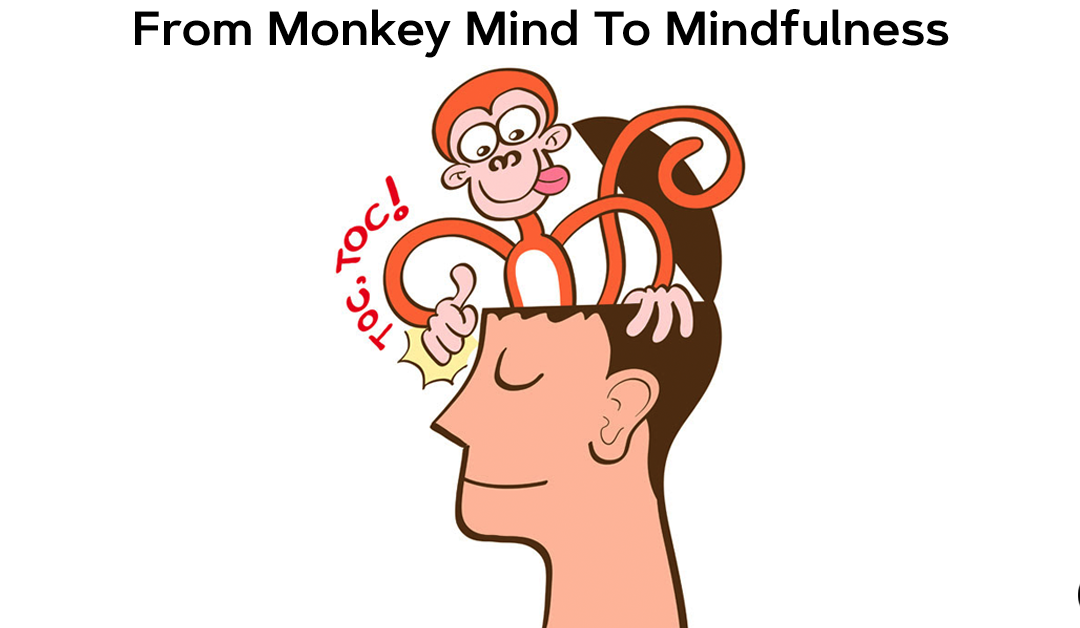From Monkey Mind To Mindfulness
Although it feels like New Years was weeks ago, we are still very much in the conversation of “New Year, New You!” Even though every January we tend to engage in a dialogue about what we can do to revamp or upgrade our lives, each year we see a few new concepts or practices added to the “what’s trending now” lists. In the past few years, the concept of mindfulness or being mindful has become a crucial part of the self-care conversation.
From the boardroom to the kindergarten classroom to centers and apps dedicated to the practice, mindfulness trainings are widespread and have become mainstream. Credited with reducing stress and anxiety and having several other physical and mental health benefits, mindfulness is often defined as the practice of bringing your full mind to a singular object or situation or, as Dr. Jon Kabat-Zinn, a professor of medicine emeritus at the University of Massachusetts Medical School and leader in the field of mindfulness, defines it, mindfulness is “paying attention in a particular way: on purpose, in the present moment and non-judgmentally.”
Although being totally present to one thing for even five to ten minutes might seem like a no-brainer, for many it is a challenge. Described as a practice that takes practice, many beginners are encouraged to practice mindfulness by bringing their attention to day-to-day activities, even something as simple as drinking a cup of tea or eating food. We are urged to smell the food, taste the food, chew the food, and truly be in the experience of the food.
Yet for most of us, after the first few seconds, we are no longer savoring the experience but judging it. Our mindfulness has turned to monkey mind, filling our heads with thoughts like:
- Am I doing this mindfulness thing right?
- This is crazy.
- Is this food making me fat?
- I don’t have time to do this! I have a hundred other things on my to-do list.
- I can’t believe I can’t be mindful for 30 seconds.
- I failed mindfulness!
So, what is it that causes us to go from mindfulness to monkey mind in just a matter of minutes?
Many articles are written about the obstacles people experience when practicing mindfulness. They mention reasons like everyday distractions, being unable to sit still, and growing discouraged as a result of not instantly feeling and seeing the benefits. Although all of these challenges are real, after working with hundreds of people over the years, I believe that the one thing that fills our minds with messiness and minimizes our ability to be mindful are what I call “Integrity Snatchers.” Integrity Snatchers are the influences that erode our courage, confidence, capabilities, and sense of calm. They are the culprits that join together in that choir of condemnation, confusion, criticism, and chaos that loops in our heads. They act as a catalyst for self-doubt, self-sabotage, and settling. They propel us out of the present moment as well as any sense of positivity and land us in a minefield of stinking thinking. Specifically, Integrity Snatchers are the shadows that fill our minds and create our internal and external messiness.
Our shadows — our shame, fears, insecurities, negative beliefs, and feelings of not enough — lurk in our unconscious and are incessantly telling us what we can and cannot do and what we should or should not be doing. They drive us to revisit the past and worry about the future. Their consistent and insidious dialogue is what causes the stress and angst that makes mindfulness so necessary. Although practice, patience, and positivity may be a prescription for mastering mindfulnesss, doing shadow work is a surefire remedy for success.
We have all heard the adage, “What you resist persists.” We don’t want to make our Integrity Snatchers and our shadows wrong, since that would be making ourselves wrong and just add more fodder to our monkey minds. They are part of our humanity. Yet, as I write in The Integrity Advantage,
“When you become aware of your Integrity Snatchers,
you can remove them from their seat of power.”
That’s one of the reasons that I always look forward to The Shadow Process, our weekend workshop where people learn to unconceal, make peace with, and integrate their shadows. One of the things that always amazes me about this process is that after the two and a half days, nothing in the outer world of our participants has changed. When they leave the workshop on Sunday, their work situation, bank balance, condition of their body, or state of their relationship with their spouse or mother remains the same. But their relationship with their shadows and themselves has totally shifted and that creates the opening for everything else in their life to evolve and grow!
The process guides them to see themselves, their past, and the possibilities for their future in a brand new light. They find answers from within that they never knew they had. Suddenly, the negative internal dialogue that has been running their lives is no longer in control. Instead, it is replaced with words of compassion, acceptance, and a sacred knowingness that everything they have endured or experienced is there to support the evolution of their soul and is part of their divine recipe. This new relationship with themselves is nothing short of a revolution that transforms their inner world and has the power to transform their outer world.
It is this newfound peace of mind which quiets their monkey mind and makes mindfulness a consistent and easily attainable state of mind. Actually, many of our participants tell us that after the process they experience something very foreign – a quiet mind.
So, if you want to remove the obstacles to mindfulness, yes, practice and patience are key. But I invite you to do shadow work. It will be the catalyst for you to make peace your past and your pessimism so you can unwrap the gifts of the present.
Transformational Action Steps
To quiet your monkey mind and master mindfulness, take time to do shadow work.
(1) Observe the thoughts and beliefs that loop in your brain and chip away at your ability to stay present. Write them down.
(2) Looking at your list, own that these are just thoughts.
(3) See how these thoughts have served you or pushed you to be or do more. Find their gifts.
(4) Identify positive thoughts about yourself that will counterbalance the negative ones.
(5) To truly accelerate your mindfulness practice, join us at The Shadow Process April 6th to April 8th in Los Angeles. Click here to learn more.



